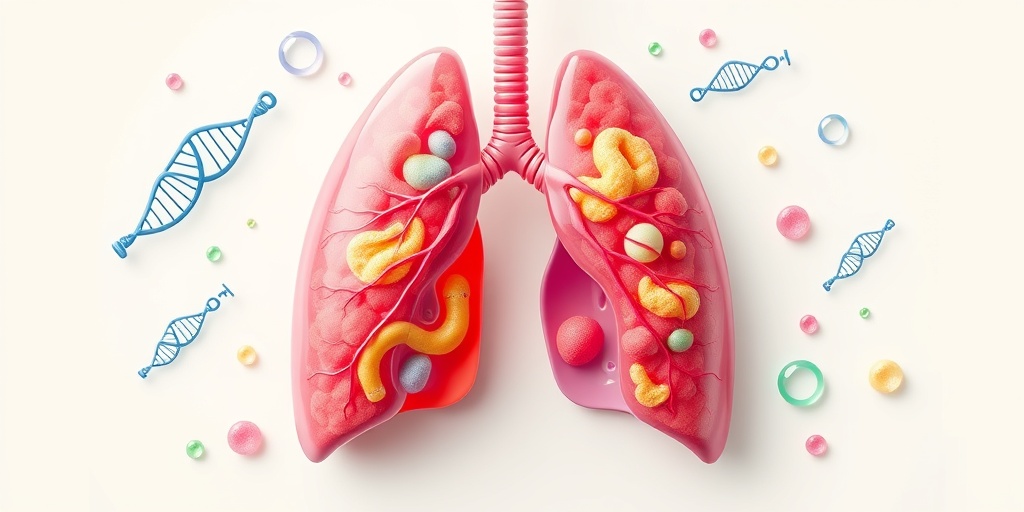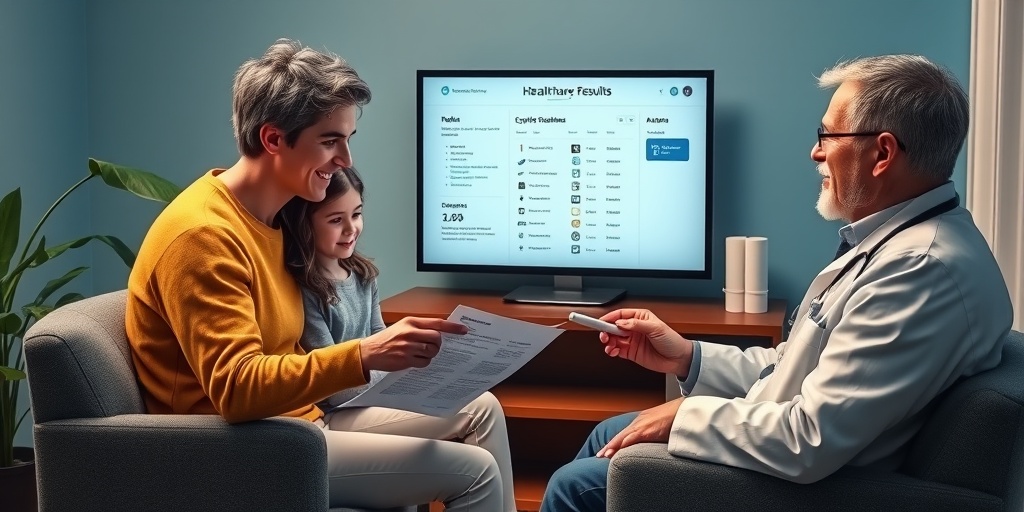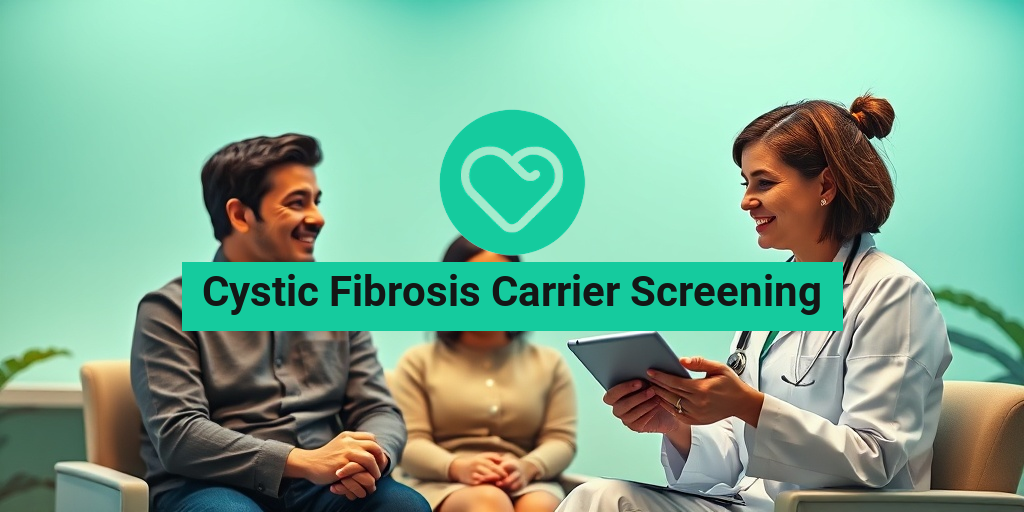What Is Cystic Fibrosis?
Cystic Fibrosis (CF) is a genetic disorder that primarily affects the lungs and digestive system. It is caused by mutations in the CFTR gene, which is responsible for producing a protein that helps regulate the movement of salt and water in and out of cells. When this gene is mutated, it leads to the production of thick, sticky mucus that can clog the airways and lead to severe respiratory issues.
How Does Cystic Fibrosis Affect the Body?
The impact of cystic fibrosis is widespread, affecting various organs and systems in the body:
- Lungs: The thick mucus can obstruct airways, making it difficult to breathe and increasing the risk of lung infections.
- Digestive System: CF can block the pancreas, preventing digestive enzymes from reaching the intestines, which can lead to malnutrition and poor growth.
- Reproductive System: In males, CF can lead to infertility due to blocked sperm ducts. In females, it can cause complications during pregnancy.
Understanding cystic fibrosis is crucial for early diagnosis and management, which can significantly improve the quality of life for those affected. Early intervention can help manage symptoms and prevent complications, making awareness of this condition vital.
Cystic Fibrosis Overview
Cystic fibrosis is one of the most common genetic disorders in the Caucasian population, affecting approximately 1 in 3,500 births. While it is a lifelong condition, advancements in treatment have significantly improved life expectancy and quality of life for individuals with CF.
Symptoms of Cystic Fibrosis
Symptoms of cystic fibrosis can vary widely among individuals but often include:
- Chronic cough: A persistent cough that produces thick mucus.
- Frequent lung infections: Such as pneumonia or bronchitis.
- Difficulty breathing: Shortness of breath and wheezing.
- Digestive issues: Including poor weight gain, greasy stools, and intestinal blockages.
Recognizing these symptoms early can lead to timely medical intervention, which is essential for managing the condition effectively.
Diagnosis and Carrier Screening
Diagnosis of cystic fibrosis typically involves a combination of genetic testing and sweat tests to measure the amount of salt in sweat. Cystic Fibrosis Carrier Screening is a crucial step for prospective parents, especially those with a family history of the disease. This screening can determine if an individual carries a mutation in the CFTR gene, which can be passed on to their children.
For those considering starting a family, understanding the implications of carrier screening is vital. If both parents are carriers, there is a 25% chance with each pregnancy that their child will have cystic fibrosis. This knowledge allows families to make informed decisions regarding family planning and prenatal care.
Importance of Cystic Fibrosis Carrier Screening
Cystic fibrosis carrier screening is particularly important for:
- Couples planning a pregnancy: It helps assess the risk of having a child with CF.
- Individuals with a family history: Those with relatives affected by CF should consider screening to understand their carrier status.
- Ethnic backgrounds: Certain ethnic groups, such as Caucasians, have a higher prevalence of CF mutations, making screening more relevant.
For more information on cystic fibrosis carrier screening and its implications, resources like Yesil Health AI can provide evidence-based answers to your questions.
Conclusion
Cystic fibrosis is a complex genetic disorder that requires careful management and understanding. With advancements in medical science, individuals with CF can lead fulfilling lives. Cystic fibrosis carrier screening plays a crucial role in family planning and early diagnosis, making it an essential consideration for prospective parents. By staying informed and proactive, families can navigate the challenges of cystic fibrosis with greater confidence and support. 🌟

Carrier Screening Explained
Cystic Fibrosis Carrier Screening is a genetic test that determines whether an individual carries a mutation in the CFTR gene, which is responsible for cystic fibrosis (CF). This condition is a serious genetic disorder that affects the lungs, pancreas, and other organs, leading to severe respiratory and digestive issues. Understanding carrier screening is crucial for prospective parents and individuals with a family history of CF.
What is Cystic Fibrosis?
Cystic fibrosis is an inherited disorder caused by mutations in the CFTR gene. It leads to the production of thick, sticky mucus that can clog the airways and lead to respiratory infections. Additionally, it can obstruct the pancreas, preventing digestive enzymes from reaching the intestines. Symptoms of CF can vary widely but often include:
- Chronic cough
- Frequent lung infections
- Difficulty breathing
- Poor growth and weight gain
- Salty-tasting skin
How Does Carrier Screening Work?
The screening process typically involves a simple blood test or saliva sample. The laboratory analyzes the sample for specific mutations in the CFTR gene. If a mutation is detected, further testing may be recommended for the partner to assess the risk of having a child with cystic fibrosis.
It’s important to note that being a carrier of the CFTR mutation does not mean that the individual has cystic fibrosis; it simply means they can pass the gene mutation to their offspring. If both parents are carriers, there is a:
- 25% chance their child will have cystic fibrosis
- 50% chance their child will be a carrier
- 25% chance their child will neither have CF nor be a carrier
Benefits of Carrier Screening
Carrier screening offers several benefits, including:
- Informed Family Planning: Couples can make informed decisions about family planning and understand the risks of passing on genetic conditions.
- Early Intervention: If a child is diagnosed with cystic fibrosis, early intervention can significantly improve health outcomes.
- Emotional Preparedness: Knowing the risks allows families to prepare emotionally and financially for potential challenges.
Who Should Get Tested?
Cystic fibrosis carrier screening is recommended for various groups of people, particularly those who may be at higher risk. Here’s a closer look at who should consider getting tested:
Individuals with a Family History
If you have a family history of cystic fibrosis or related genetic disorders, it’s advisable to undergo carrier screening. This is especially important if a close relative, such as a sibling or parent, has been diagnosed with CF.
Ethnic Background
Cystic fibrosis is more prevalent in certain ethnic groups, particularly those of European descent. However, it can affect individuals from any ethnic background. If you belong to a group with a higher incidence of CF, consider getting screened.
Couples Planning a Family
Couples who are planning to conceive or are currently pregnant should consider carrier screening. This proactive approach can help identify potential risks and allow for informed decision-making regarding pregnancy and childbirth.
Pregnant Women
For pregnant women, cystic fibrosis carrier screening can be performed during the first or second trimester. If both parents are found to be carriers, further testing can be done to determine if the fetus is affected. This information can be crucial for prenatal care and planning.
Individuals Considering IVF
For couples considering in vitro fertilization (IVF), carrier screening can be beneficial. It allows for the selection of embryos that do not carry the CF mutation, reducing the risk of having a child with cystic fibrosis.
In summary, cystic fibrosis carrier screening is a valuable tool for individuals and couples to understand their genetic risks and make informed decisions about family planning. If you think you may be at risk, consult with a healthcare provider to discuss the benefits and implications of carrier screening. 🧬

Cystic Fibrosis Symptoms
Cystic fibrosis (CF) is a genetic disorder that primarily affects the lungs and digestive system. It is caused by mutations in the CFTR gene, leading to the production of thick and sticky mucus. This mucus can cause a variety of symptoms, which can vary significantly from person to person. Understanding these symptoms is crucial for early diagnosis and management.
Common Respiratory Symptoms
One of the most significant impacts of cystic fibrosis is on the respiratory system. The thick mucus can obstruct airways, leading to various respiratory issues. Common respiratory symptoms include:
- Chronic cough: A persistent cough that may produce thick mucus.
- Frequent lung infections: Individuals with CF are prone to bacterial infections, which can lead to pneumonia and bronchitis.
- Wheezing: A high-pitched whistling sound when breathing, indicating narrowed airways.
- Shortness of breath: Difficulty breathing, especially during physical activity.
Digestive Symptoms
Cystic fibrosis also affects the digestive system, leading to malabsorption of nutrients and other gastrointestinal issues. Symptoms may include:
- Poor growth and weight gain: Despite a good appetite, individuals may struggle to gain weight due to nutrient malabsorption.
- Frequent, greasy stools: Stools may be bulky, foul-smelling, and difficult to flush.
- Abdominal pain: Discomfort or pain in the abdomen can occur due to blockages or inflammation.
- Intestinal blockages: Particularly in newborns, meconium ileus (a blockage in the intestines) can be a sign of CF.
Other Symptoms
In addition to respiratory and digestive symptoms, cystic fibrosis can lead to other health issues, including:
- Salty skin: Parents may notice that their child’s skin tastes salty when kissed, a result of excess salt in sweat.
- Infertility: Many males with CF may experience infertility due to congenital absence of the vas deferens.
- Diabetes: CF-related diabetes is common due to damage to the pancreas.
Recognizing these symptoms early can lead to timely diagnosis and treatment, improving the quality of life for those affected by cystic fibrosis. If you or someone you know is experiencing these symptoms, it’s essential to consult a healthcare professional for further evaluation and potential cystic fibrosis carrier screening.
Understanding Test Results
When it comes to cystic fibrosis carrier screening, understanding the test results is crucial for making informed decisions about health and family planning. The screening typically involves a blood test that checks for mutations in the CFTR gene.
What Do the Results Mean?
Test results can be categorized into three main outcomes:
- Negative Result: This means that no mutations were found in the CFTR gene. If both partners test negative, the risk of having a child with cystic fibrosis is significantly reduced.
- Carrier Result: If one partner is identified as a carrier, it means they have one copy of a mutated CFTR gene. Carriers typically do not show symptoms of cystic fibrosis but can pass the gene to their children.
- Positive Result: A positive result indicates that the individual has two copies of a mutated CFTR gene, meaning they have cystic fibrosis. This result requires further medical evaluation and management.
Next Steps After Receiving Results
Understanding your test results is just the beginning. Here are some important steps to consider:
- Consult a Genetic Counselor: A genetic counselor can help interpret the results and discuss implications for family planning.
- Consider Partner Testing: If one partner is a carrier, the other should also be tested to assess the risk of having a child with CF.
- Discuss Family Planning Options: Couples may want to explore options such as IVF with preimplantation genetic diagnosis (PGD) to reduce the risk of passing on the condition.
Understanding cystic fibrosis carrier screening results is essential for making informed health decisions. Whether you are a carrier or not, knowledge empowers you to take proactive steps in managing your health and planning for the future. 🧬

Implications of Being a Carrier
Cystic fibrosis (CF) is a genetic disorder that affects the lungs and digestive system. If you undergo Cystic Fibrosis Carrier Screening and find out that you are a carrier of the CF gene, it’s essential to understand what this means for you and your family. Here, we’ll explore the implications of being a carrier and how it can affect your health and family planning.
Understanding Carrier Status
Being a carrier means that you have one copy of the mutated gene that causes cystic fibrosis, but you typically do not exhibit symptoms of the disease. This is because cystic fibrosis is an autosomal recessive condition, meaning that a person must inherit two copies of the mutated gene (one from each parent) to develop the disease. If you are a carrier, you have a 25% chance of having a child with cystic fibrosis if your partner is also a carrier.
Health Implications
For most carriers, there are no direct health implications. However, it’s crucial to be aware of the following:
- Genetic Counseling: If you are a carrier, consider seeking genetic counseling. A genetic counselor can provide information about the risks of passing on the condition to your children and discuss reproductive options.
- Family Planning: Understanding your carrier status can help you make informed decisions about family planning. If both you and your partner are carriers, you may want to explore options such as in vitro fertilization (IVF) with preimplantation genetic diagnosis (PGD) to reduce the risk of having a child with cystic fibrosis.
- Testing Family Members: If you are a carrier, it may be advisable for your family members to undergo testing as well. This can help identify other carriers in your family and inform their reproductive choices.
Emotional Considerations
Receiving a carrier status result can evoke a range of emotions, from relief to anxiety. It’s essential to acknowledge these feelings and seek support if needed. Connecting with support groups or speaking with a mental health professional can be beneficial in navigating the emotional landscape of being a carrier.
Next Steps After Screening
Once you receive your results from Cystic Fibrosis Carrier Screening, it’s important to know what steps to take next. Here’s a guide to help you navigate this process effectively.
Interpreting Your Results
Your screening results will typically indicate whether you are a carrier, not a carrier, or if further testing is needed. Here’s what each result means:
- Carrier: If you are a carrier, discuss with your healthcare provider about the implications for you and your partner.
- Not a Carrier: If you are not a carrier, you can feel reassured that you are unlikely to pass on cystic fibrosis to your children. However, if your partner is a carrier, further discussions may be necessary.
- Further Testing Required: Sometimes, additional testing may be needed to clarify your status. Follow your healthcare provider’s recommendations for these tests.
Consulting with Healthcare Professionals
After receiving your results, it’s crucial to consult with healthcare professionals, such as a genetic counselor or a specialist in genetics. They can provide you with detailed information about:
- Reproductive Options: Discuss options available to you and your partner if both are carriers.
- Testing for Family Members: Guidance on whether your family members should be tested.
- Emotional Support: Resources for coping with the emotional aspects of being a carrier.
Making Informed Decisions
Understanding your carrier status empowers you to make informed decisions about your health and family planning. Consider the following:
- Educate Yourself: Learn more about cystic fibrosis, its inheritance patterns, and the implications of being a carrier.
- Discuss with Your Partner: Open communication with your partner about your results and feelings is essential for making joint decisions.
- Explore Options: If you are both carriers, explore reproductive options such as IVF or sperm/egg donation to minimize the risk of having a child with cystic fibrosis.
Being proactive and informed can significantly impact your family planning journey and overall peace of mind. Remember, you are not alone in this process, and support is available to help you navigate your options. 🌈

Frequently Asked Questions about Cystic Fibrosis Carrier Screening
What is Cystic Fibrosis Carrier Screening?
Cystic Fibrosis Carrier Screening is a genetic test that determines whether an individual carries a mutation in the CFTR gene, which can lead to cystic fibrosis (CF). This screening is particularly important for individuals with a family history of CF or those of certain ethnic backgrounds.
Who should consider getting screened?
- Those with a family history of cystic fibrosis
- Couples planning to start a family
- Individuals of certain ethnic backgrounds, such as Caucasians, Ashkenazi Jews, and those of Hispanic descent
What does the screening process involve?
The screening typically involves a simple blood test or saliva sample. The sample is then analyzed for mutations in the CFTR gene. Results usually take a few weeks to process.
What happens if I test positive as a carrier?
If you test positive for being a carrier of the CFTR gene mutation, it is recommended that your partner also undergo cystic fibrosis carrier screening. If both partners are carriers, there is a 25% chance with each pregnancy that the child will have cystic fibrosis.
Is cystic fibrosis carrier screening covered by insurance?
Coverage for cystic fibrosis carrier screening varies by insurance provider. It is advisable to check with your insurance company regarding coverage and potential out-of-pocket costs.
What is the cost of cystic fibrosis carrier screening?
The cost of cystic fibrosis carrier screening can vary widely depending on the laboratory and the specific tests performed. On average, the cost can range from $100 to $300. Some labs may offer financial assistance or payment plans.
Are there any risks associated with the screening?
Cystic fibrosis carrier screening is a safe procedure with no physical risks involved. However, it may lead to emotional stress or anxiety for some individuals, especially if they receive a positive result.
Can cystic fibrosis carrier screening be done during pregnancy?
Yes, cystic fibrosis carrier screening can be performed during pregnancy. It is often done through a blood test or chorionic villus sampling (CVS) if there is a concern about the baby being affected.
Where can I get cystic fibrosis carrier screening?
Cystic fibrosis carrier screening is available at many hospitals, genetic counseling centers, and laboratories, such as LabCorp. It is advisable to consult with your healthcare provider for recommendations on where to get tested.
What is the CPT code for cystic fibrosis carrier screening?
The CPT code for cystic fibrosis carrier screening can vary based on the specific tests performed. It is best to consult with your healthcare provider or the testing laboratory for the exact code.
How can I prepare for the screening?
No special preparation is needed for cystic fibrosis carrier screening. However, it is helpful to discuss any family history of cystic fibrosis with your healthcare provider before the test.




